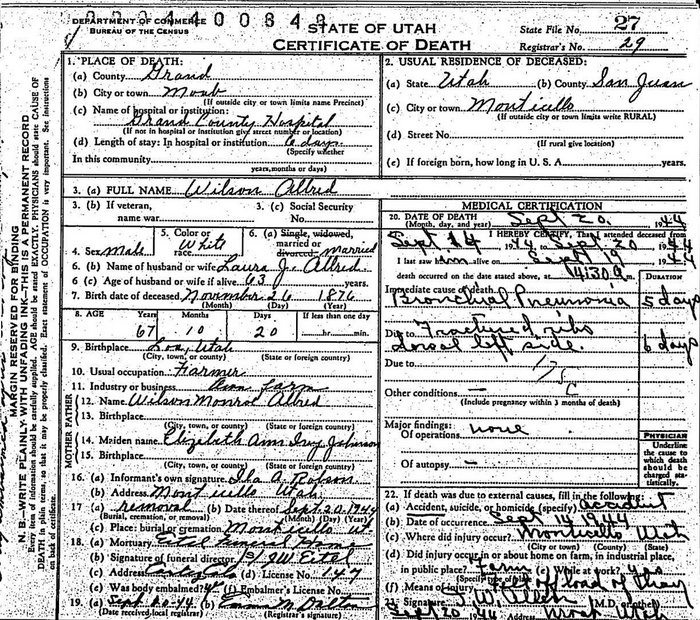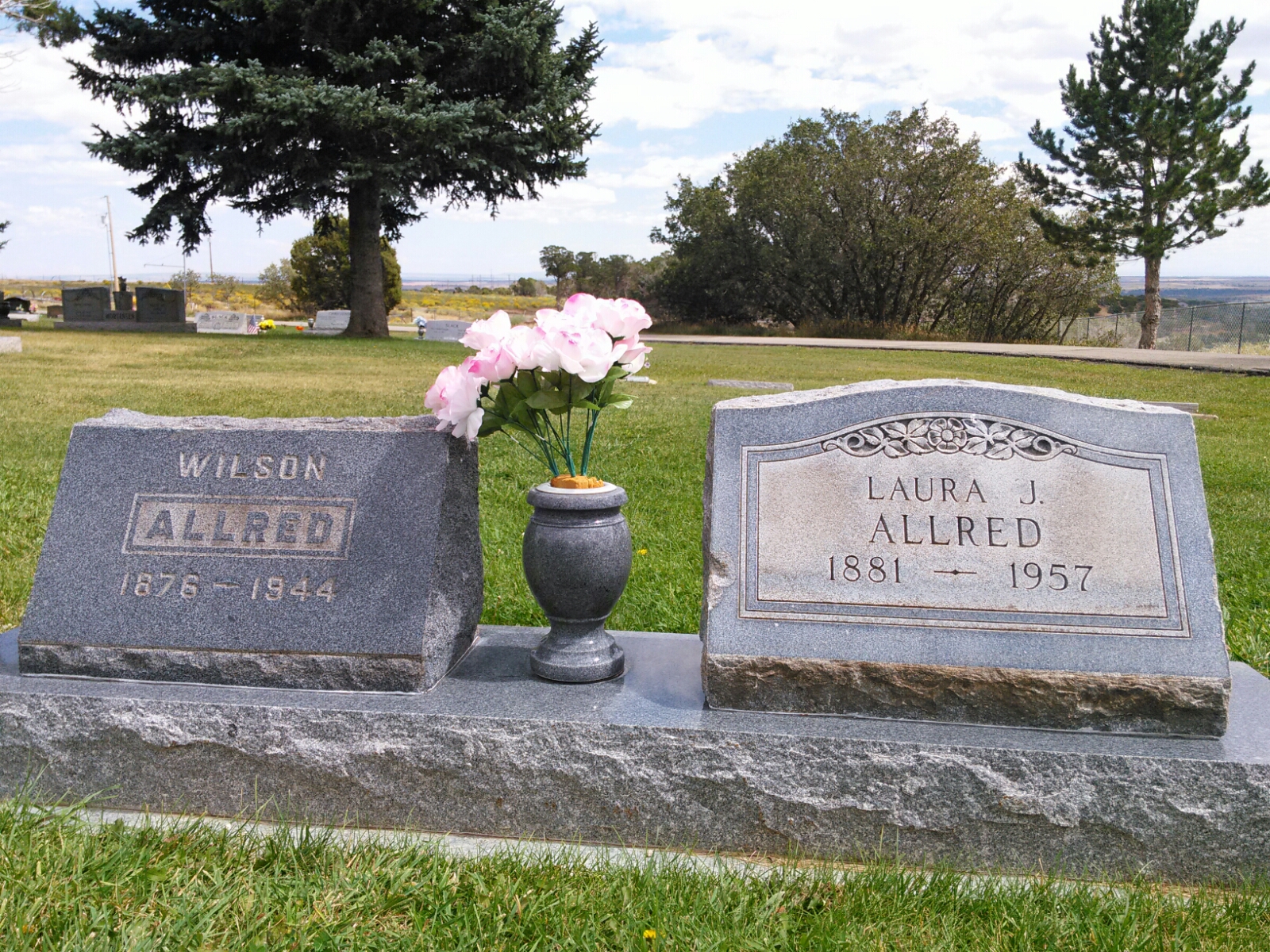Wilson Allred was the first child born in the remote Rabbit Valley, today known as Loa, located in Wayne County, Utah. His father and mother, Wilson Monroe Allred and Elizabeth Ann Ivie, were brand new settlers in the area. Wilson, their first child, was born November 26, 1876.
At the time Wilson was born, the young family had been in Rabbit Valley for only a few months. Earlier in the year, his parents had followed his uncle, Andrew Jackson Allred, who was sent to create a settlement there. However, by 1878, Wilson Monroe and Elizabeth moved seventy-five miles north, back to their extended families in Spring City, the town founded by the grandparents of Wilson Monroe, James and Elizabeth Allred.
When he was a very young teenager, Wilson, accompanied by his younger brother Birten, left Spring City forever. They traveled around, hiring out as cowboys to whatever ranches they happened across. After several years of roaming through southeastern Utah they ended up in Moab. The Johnson family, early settlers of Moab, had a ranch just outside of town. More importantly, they had two lovely daughters, Laura and Anna. Wilson and Mary Laura Johnson met at a dance and were married January 18, 1899. D.A. Johnson, uncle of Laura, performed the marriage ceremony and a wedding dance followed attended by the huge, extended Johnson family. Two years later, Birten married Anna. The two couples remained close all their lives. Several years later, when Wilson and Laura moved south to Monticello, Laura missed her sister and family very much and always thought of Moab as her true home.
Wilson, who remained a cowboy at heart all his life, was employed by Carpenter and Cunningham as a foreman on their LaSal cattle ranch. Wilson and Laura spent the early years of their marriage at the ranch. Their first two children, Horace and Ila, were born there.
After the children started coming, the little family moved into town. They bought a home and some farmland in Moab. Here, they raised corn, hay, had a large garden and some fruit trees. There was a spring on the hillside of their property that supplied water for their household and irrigation water for their garden and trees.
Five more children were born to the family in Moab: Eugene, Julia, Carl, Page and Waldo.
In 1910, Wilson and Birt embarked on a commercial freight hauling enterprise known as the Allred Transportation Company. Their lucky break was landing a mail and freight contract. At first, horses, buggies and wagons were used to haul the loads from the Denver and Rio Grande Railway at Thompson Springs. Relay stations were established along the route. Keeping the freight moving was very difficult. The roads could barely be classified as roads. There were frequent heavy rains and floods, which washed out the roads, and sand storms that hindered travel. They hauled the freight in areas such as Courthouse Wash. It was rough and dangerous territory. Until 1912, they had to ferry the freight across the Colorado River. After that, they had the beautiful Dewey Bridge to cross.
The Allred Transportation Company was so successful that, in addition to the Thompson to Moab route, the brothers were awarded the contract from Moab south to Monticello. This route required one relay station at Looking Glass Rock. They also supplemented the horses, buggies and wagons with two Rambler automobiles.
The Allred Brothers sold their stage lines in 1917. In the spring of 1918, Wilson and Laura moved to Monticello. They bought a home and 60 acres of land. Wilson began dry farming west of town. He also had a large herd of cattle and raised crops necessary to keep the livestock. Laura sold milk, eggs and butter in town to supplement the family income. She raised a large garden and canned the food necessary to keep a growing family. East of the house, she also had a large flower garden in order to supply flowers for weddings and funerals. South of the house was an orchard which kept the family in fruit during the long Monticello winters. West of the house was an icehouse. The ice was kept all summer. Laura could always be depended upon to have homemade ice cream for all-important occasions. With the addition of chickens and pigs, the family always had plenty of good and nourishing food. Laura was a famous cook and Wilson was known as a hard-working man, a good provider for his family.
The children grew, married and settled close to their parents. On Christmas Day, the whole clan would gather at the family home. While Laura cooked the big turkey dinner, Wilson would hitch up his famous team of horses to the sleigh and drive around collecting all the children and grandchildren. What wonderful memories exist of those times.
While hauling a huge load of hay, in the summer of 1944, Wilson suffered a tragic accident. A sudden lurch of the horses caused him to tumble from the top of the load. He died a few days later.
None of the sons were interested in farming, they had gone on to other endeavors, so Laura sold the livestock and, over the years, sold most of the farmland. She stayed on at the homestead, kept a few cows and continued to sell milk and butter that she carried to town every day.
Wilson Allred was a taciturn man with an unassailable reputation for honesty and integrity. He was a man of honor.
Written by his granddaughter, Sara Allred Jense Watson
Wilson Allred was the first child born in the remote Rabbit Valley, today known as Loa, located in Wayne County, Utah. His father and mother, Wilson Monroe Allred and Elizabeth Ann Ivie, were brand new settlers in the area. Wilson, their first child, was born November 26, 1876.
At the time Wilson was born, the young family had been in Rabbit Valley for only a few months. Earlier in the year, his parents had followed his uncle, Andrew Jackson Allred, who was sent to create a settlement there. However, by 1878, Wilson Monroe and Elizabeth moved seventy-five miles north, back to their extended families in Spring City, the town founded by the grandparents of Wilson Monroe, James and Elizabeth Allred.
When he was a very young teenager, Wilson, accompanied by his younger brother Birten, left Spring City forever. They traveled around, hiring out as cowboys to whatever ranches they happened across. After several years of roaming through southeastern Utah they ended up in Moab. The Johnson family, early settlers of Moab, had a ranch just outside of town. More importantly, they had two lovely daughters, Laura and Anna. Wilson and Mary Laura Johnson met at a dance and were married January 18, 1899. D.A. Johnson, uncle of Laura, performed the marriage ceremony and a wedding dance followed attended by the huge, extended Johnson family. Two years later, Birten married Anna. The two couples remained close all their lives. Several years later, when Wilson and Laura moved south to Monticello, Laura missed her sister and family very much and always thought of Moab as her true home.
Wilson, who remained a cowboy at heart all his life, was employed by Carpenter and Cunningham as a foreman on their LaSal cattle ranch. Wilson and Laura spent the early years of their marriage at the ranch. Their first two children, Horace and Ila, were born there.
After the children started coming, the little family moved into town. They bought a home and some farmland in Moab. Here, they raised corn, hay, had a large garden and some fruit trees. There was a spring on the hillside of their property that supplied water for their household and irrigation water for their garden and trees.
Five more children were born to the family in Moab: Eugene, Julia, Carl, Page and Waldo.
In 1910, Wilson and Birt embarked on a commercial freight hauling enterprise known as the Allred Transportation Company. Their lucky break was landing a mail and freight contract. At first, horses, buggies and wagons were used to haul the loads from the Denver and Rio Grande Railway at Thompson Springs. Relay stations were established along the route. Keeping the freight moving was very difficult. The roads could barely be classified as roads. There were frequent heavy rains and floods, which washed out the roads, and sand storms that hindered travel. They hauled the freight in areas such as Courthouse Wash. It was rough and dangerous territory. Until 1912, they had to ferry the freight across the Colorado River. After that, they had the beautiful Dewey Bridge to cross.
The Allred Transportation Company was so successful that, in addition to the Thompson to Moab route, the brothers were awarded the contract from Moab south to Monticello. This route required one relay station at Looking Glass Rock. They also supplemented the horses, buggies and wagons with two Rambler automobiles.
The Allred Brothers sold their stage lines in 1917. In the spring of 1918, Wilson and Laura moved to Monticello. They bought a home and 60 acres of land. Wilson began dry farming west of town. He also had a large herd of cattle and raised crops necessary to keep the livestock. Laura sold milk, eggs and butter in town to supplement the family income. She raised a large garden and canned the food necessary to keep a growing family. East of the house, she also had a large flower garden in order to supply flowers for weddings and funerals. South of the house was an orchard which kept the family in fruit during the long Monticello winters. West of the house was an icehouse. The ice was kept all summer. Laura could always be depended upon to have homemade ice cream for all-important occasions. With the addition of chickens and pigs, the family always had plenty of good and nourishing food. Laura was a famous cook and Wilson was known as a hard-working man, a good provider for his family.
The children grew, married and settled close to their parents. On Christmas Day, the whole clan would gather at the family home. While Laura cooked the big turkey dinner, Wilson would hitch up his famous team of horses to the sleigh and drive around collecting all the children and grandchildren. What wonderful memories exist of those times.
While hauling a huge load of hay, in the summer of 1944, Wilson suffered a tragic accident. A sudden lurch of the horses caused him to tumble from the top of the load. He died a few days later.
None of the sons were interested in farming, they had gone on to other endeavors, so Laura sold the livestock and, over the years, sold most of the farmland. She stayed on at the homestead, kept a few cows and continued to sell milk and butter that she carried to town every day.
Wilson Allred was a taciturn man with an unassailable reputation for honesty and integrity. He was a man of honor.
Written by his granddaughter, Sara Allred Jense Watson
Family Members
Sponsored by Ancestry
Advertisement
Explore more
Sponsored by Ancestry
Advertisement




























